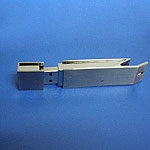usb device
USB implements connections to storage devices using a set of standards called the USB mass storage device class (referred to as MSC or UMS). This was initially intended for traditional magnetic and optical drives, but has been extended to support a wide variety of devices, particularly flash drives. This generality is because many systems can be controlled with the familiar idiom of file manipulation within directories (the process of making a novel device look like a familiar device is also known as extension).
Though most newer computers are capable of booting off USB mass storage devices, USB is not intended to be a primary bus for a computer's internal storage: buses such as ATA (IDE), Serial ATA (SATA), or SCSI fulfill that role in PC class computers. However, USB has one important advantage in that it is possible to install and remove devices without opening the computer case, making it useful for mobile peripherals, including drives of various kinds. Originally conceived and still used today for optical storage devices (CD-RW drives, DVD drives, etc.), several manufacturers offer external portable USB hard drives, or empty enclosures for disk drives, which offer performance comparable to internal drives, limited by the current number and type of attached USB devices and by the upper limit of the USB interface (in practice about 40 MiB/s for USB 2.0 and perhaps potentially 400 MiB/s or more. for USB 3.0). These external drives have typically included a "translating device" that bridges between a drive's interface (IDE, ATA, SATA, PATA, ATAPI, or even SCSI) to a USB interface port. Functionally, the drive appears to the user much like an internal drive. Other competing standards for external drive connectivity include eSATA, ExpressCard (now at version 2.0), and FireWire (IEEE 1394).
Another use for USB mass storage devices is the portable execution of software applications (such as web browsers and VoIP clients) without requiring installation on the host computer.
Though most newer computers are capable of booting off USB mass storage devices, USB is not intended to be a primary bus for a computer's internal storage: buses such as ATA (IDE), Serial ATA (SATA), or SCSI fulfill that role in PC class computers. However, USB has one important advantage in that it is possible to install and remove devices without opening the computer case, making it useful for mobile peripherals, including drives of various kinds. Originally conceived and still used today for optical storage devices (CD-RW drives, DVD drives, etc.), several manufacturers offer external portable USB hard drives, or empty enclosures for disk drives, which offer performance comparable to internal drives, limited by the current number and type of attached USB devices and by the upper limit of the USB interface (in practice about 40 MiB/s for USB 2.0 and perhaps potentially 400 MiB/s or more. for USB 3.0). These external drives have typically included a "translating device" that bridges between a drive's interface (IDE, ATA, SATA, PATA, ATAPI, or even SCSI) to a USB interface port. Functionally, the drive appears to the user much like an internal drive. Other competing standards for external drive connectivity include eSATA, ExpressCard (now at version 2.0), and FireWire (IEEE 1394).
Another use for USB mass storage devices is the portable execution of software applications (such as web browsers and VoIP clients) without requiring installation on the host computer.
For more information, please visit this articles web page.
This article was published on Wednesday 23 September, 2009.
Current Reviews: 0
Categories
- 0 items
Articles
Currencies







